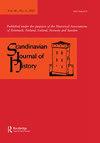All the King’s men. The incorporation of Iceland into the Norwegian Realm
IF 0.8
3区 历史学
Q1 HISTORY
引用次数: 1
Abstract
ABSTRACT It is a common supposition that Iceland became a part of Norway over a period of few years following 1262, that this was done through the adoption of a document known as The Old Covenant (ON. Gamli sattmali) and that the most important part of this transition was that the Icelanders now accepted the Norwegian king as their own king. Some of these statements must be subject to qualification. In fact, different parts of Iceland became subject to the Norwegian king at various times, the Old Covenant had no legal status neither in Iceland nor the Norwegian kingdom at large, and the Norwegian king had already been accepted as the ruler of most of Iceland before 1262.This article will demonstrate that the incorporation of Iceland into the Norwegian realm involved three distinct but interconnected issues: The introduction of government into Iceland, the introduction of regular taxation and, finally, the adjustment of Icelandic laws to reflect the laws of the Norwegian kingdom. The focus will not be on the events of a single year or a period of few years, but on a longer period of transition, from 1220 to 1281, of which the adaption of Jonsbok was the final act. The adoption of a new law code changed the nature of the government that had been introduced in Iceland, which became more centralized than anyone might have expected. With the adoption of Jonsbok at the Icelandic parliament in 1281, the incorporation of Iceland into the Norwegian kingdom was finalized. The new law code defined the status of the king and the new government of Iceland and harmonized Icelandic laws with the laws of other parts of the kingdom, although Iceland retained some of its separate legal tradition.所有国王的人。冰岛并入挪威王国
人们普遍认为,冰岛在1262年之后的几年里成为挪威的一部分,这是通过一份被称为《旧约》(ON)的文件实现的。这一转变中最重要的部分是冰岛人现在接受了挪威国王作为他们自己的国王。其中一些陈述必须加以限制。事实上,冰岛的不同地区曾在不同时期臣服于挪威国王,《旧约》在冰岛和整个挪威王国都没有法律地位,而挪威国王在1262年之前就已经被接受为冰岛大部分地区的统治者。本文将证明冰岛并入挪威王国涉及三个不同但相互关联的问题:将政府引入冰岛,引入常规税收,最后调整冰岛法律以反映挪威王国的法律。重点将不是一年或几年的事件,而是从1220年到1281年的更长的过渡时期,其中改编《宗谱》是最后一幕。新法典的采用改变了冰岛政府的性质,冰岛政府变得比任何人想象的都更加集中。1281年,冰岛议会通过了Jonsbok法案,冰岛最终被纳入挪威王国。新的法典规定了冰岛国王和新政府的地位,并使冰岛法律与王国其他地区的法律相协调,尽管冰岛保留了一些独立的法律传统。
本文章由计算机程序翻译,如有差异,请以英文原文为准。
求助全文
约1分钟内获得全文
求助全文
来源期刊

SCANDINAVIAN JOURNAL OF HISTORY
HISTORY-
CiteScore
1.10
自引率
20.00%
发文量
33
期刊介绍:
Scandinavian Journal of History presents articles on Scandinavian history and review essays surveying themes in recent Scandinavian historical research. It concentrates on perspectives of national historical particularities and important long-term and short-term developments. The editorial policy gives particular priority to Scandinavian topics and to efforts of placing Scandinavian developments into a larger context. Studies explicitly comparing Scandinavian processes and phenomena to those in other parts of the world are therefore regarded as particularly important. In addition to publishing articles and review essays, the journal includes short book reviews. Review essay proposals and polemical communications are welcomed.
 求助内容:
求助内容: 应助结果提醒方式:
应助结果提醒方式:


